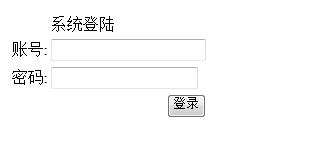软件151--李松
Posted 新人求带
tags:
篇首语:本文由小常识网(cha138.com)小编为大家整理,主要介绍了软件151--李松相关的知识,希望对你有一定的参考价值。
一、下载Struts
建立web项目,给项目添加外部引用包(project-properties-Java Build Path-Add External Jars...)。添加的包有:commons-fileupload-1.2.1.jar,commons-io-1.3.2.jar,commons-logging-api-1.1.jar,freemarker-2.3.16.jar,javassist-3.7.ga.jar,ognl-3.0.jar,struts2-core-2.2.1.1.jar,xwork-core-2.2.1.1.jar。注意:由于struts2版本的差异性,上面提到的包不一定满足所有版本的需求。配置完struts2后,请部署运行一下。根据运行时的错误提示来添加jar包解决问题。
二、创建web项目,导入使用struts2所必须的jar包。
在MyEclipse项目中的src根目录下建立一个struts.xml文件。(可以打开下载的struts2安装包里的apps目录下的任意一个jar包,在里面的WEB_INFR/src目录下,寻找struts.xml文件,将该文件复制进项目的src根目录下,将里面的内容清空(只留下<struts>标签和头部标签即可))。
四、在web.xml中加入struts2 MVC框架启动配置
和struts.xml文件的生成类似,在struts2安装包里找到web.xml文件,将里面的<filter>和<filter-mapping>标签及其内容拷贝进项目中的web.config文件即可。
五、struts2实例--简单的登录例子
5.1 编写login.jsp页面。代码如下:
<%@ page language="java" import="java.util.*" pageEncoding="UTF-8"%>
<%@ taglib uri="/struts-tags" prefix="s" %>
<!DOCTYPE html PUBLIC "-//W3C//DTD HTML 4.01 Transitional//EN">
<html>
<head>
<title>Login</title>
<meta http-equiv="pragma" content="no-cache">
<meta http-equiv="cache-control" content="no-cache">
<meta http-equiv="expires" content="0">
<meta http-equiv="keywords" content="keyword1,keyword2,keyword3">
<meta http-equiv="description" content="This is my page">
</head>
<body>
<s:form action="/login" method="post">
<s:label value="系统登陆"></s:label>
<s:textfield name="username" label="账号" />
<s:password name="password" label="密码" />
<s:submit value="登录" />
</s:form>
</body>
</html>
5.2 编写LoginAction类。代码如下:
package com.gsww.kingreturns.struts2.excise;
import com.opensymphony.xwork2.ActionSupport;
public class LoginAction extends ActionSupport {//该类继承了ActionSupport类。这样就可以直接使用SUCCESS, LOGIN等变量和重写execute等方法
private static final long serialVersionUID = 1L;
private String username;
private String password;
public String getUsername() {
return username;
}
public void setUsername(String username) {
this.username = username;
}
public String getPassword() {
return password;
}
public void setPassword(String password) {
this.password = password;
}
@Override
public String execute() throws Exception {
if("haha".equals(username) && "hehe".equals(password))//如果登录的用户名=haha并且密码=hehe,就返回SUCCESS;否则,返回LOGIN
return SUCCESS;
return LOGIN;
}
}
5.3 配置struts.xml文件。代码如下:
<?xml version="1.0" encoding="UTF-8" ?>
<!DOCTYPE struts PUBLIC
"-//Apache Software Foundation//DTD Struts Configuration 2.0//EN"
"http://struts.apache.org/dtds/struts-2.0.dtd">
<struts>
<package name="default" namespace="/" extends="struts-default">
<action name="login" class="com.gsww.kingreturns.struts2.excise.LoginAction" method="execute">
<result name="success">/welcome.jsp</result>
<result name="login">/login.jsp</result>
</action>
</package>
</struts>
5.4 配置web.xml文件。代码如下:
<?xml version="1.0" encoding="UTF-8"?>
<web-app version="2.5"
xmlns="http://java.sun.com/xml/ns/javaee"
xmlns:xsi="http://www.w3.org/2001/XMLSchema-instance"
xsi:schemaLocation="http://java.sun.com/xml/ns/javaee
http://java.sun.com/xml/ns/javaee/web-app_2_5.xsd">
<filter>
<filter-name>struts2</filter-name>
<filter-class>org.apache.struts2.dispatcher.ng.filter.StrutsPrepareAndExecuteFilter</filter-class>
</filter>
<filter-mapping>
<filter-name>struts2</filter-name>
<url-pattern>/*</url-pattern>
</filter-mapping>
<welcome-file-list>
<welcome-file>index.jsp</welcome-file>
</welcome-file-list>
</web-app>
5.5 根据struts.xml里配置的内容,还需要一个welcome.jsp页面。编写welcome.jsp页面。代码如下:
<%@ page language="java" import="java.util.*" pageEncoding="UTF-8"%>
<!DOCTYPE HTML PUBLIC "-//W3C//DTD HTML 4.01 Transitional//EN">
<html>
<head>
<title>My JSP \'welcome.jsp\' starting page</title>
<meta http-equiv="pragma" content="no-cache">
<meta http-equiv="cache-control" content="no-cache">
<meta http-equiv="expires" content="0">
<meta http-equiv="keywords" content="keyword1,keyword2,keyword3">
<meta http-equiv="description" content="This is my page">
</head>
<body>
欢迎${username }!
</body>
</html>
经过上述步骤,登录实例已经编写完毕。启动tomcat,在网页地址栏里输入:http://localhost:8080/项目的名称/login.jsp,打开登录页面。如下所示:

输入用户名:haha,密码:hehe,点击登录,就来到了welcome.jsp页面。如下所示:

如果输入的用户名和密码不是haha和hehe,那么,就来到了login.jsp页面。
以上是关于软件151--李松的主要内容,如果未能解决你的问题,请参考以下文章